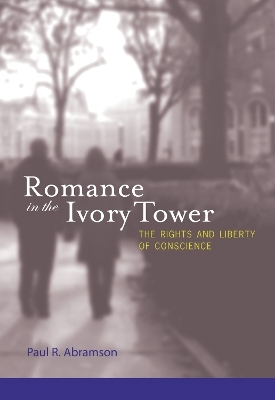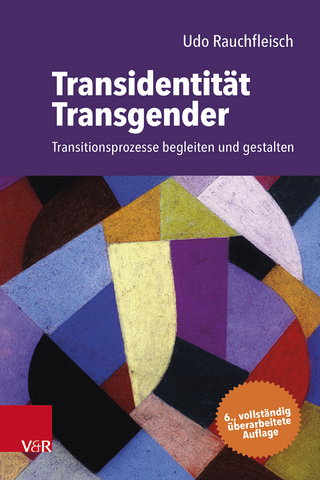
Romance in the Ivory Tower
The Rights and Liberty of Conscience
Seiten
2011
MIT Press (Verlag)
978-0-262-51592-4 (ISBN)
MIT Press (Verlag)
978-0-262-51592-4 (ISBN)
- Keine Verlagsinformationen verfügbar
- Artikel merken
Should the choice to engage in a faculty-student romance be protected or precluded? An argument that the right to choose a romantic partner is a fundamental right of conscience, protected by the U.S Constitution.
Allen Ginsberg once declared that "the best teaching is done in bed," but most university administrators would presumably disagree. Many universities prohibit romantic relationships between faculty members and students, and professors who transgress are usually out of a job. In Romance in the Ivory Tower, Paul Abramson takes aim at university policies that forbid relationships between faculty members and students. He argues provocatively that the issue of faculty-student romances transcends the seemingly trivial matter of who sleeps with whom and engages our fundamental constitutional rights. By what authority, Abramson asks, did the university become the arbiter of romantic etiquette among consenting adults? Do we, as consenting adults, have a constitutional right to make intimate choices as long as they do not cause harm? Abramson contends that we do, and bases this claim on two arguments. He suggests that the Ninth Amendment (which states that the Constitution's enumeration of certain rights should not be construed to deny others) protects the "right to romance." And, more provocatively, he argues that the "right to romance" is a fundamental right of conscience-as are freedom of speech and freedom of religion. Campus romances happen. The important question is not whether they should be encouraged or prohibited but whether the choice to engage in such a relationship should be protected or precluded. Abramson argues ringingly that our freedom to make choices-to worship, make a political speech, or fall in love-is fundamental. Rules forbidding faculty-student romances are not only unconstitutional but set dangerous precedents for further intrusion into rights of privacy and conscience.
Allen Ginsberg once declared that "the best teaching is done in bed," but most university administrators would presumably disagree. Many universities prohibit romantic relationships between faculty members and students, and professors who transgress are usually out of a job. In Romance in the Ivory Tower, Paul Abramson takes aim at university policies that forbid relationships between faculty members and students. He argues provocatively that the issue of faculty-student romances transcends the seemingly trivial matter of who sleeps with whom and engages our fundamental constitutional rights. By what authority, Abramson asks, did the university become the arbiter of romantic etiquette among consenting adults? Do we, as consenting adults, have a constitutional right to make intimate choices as long as they do not cause harm? Abramson contends that we do, and bases this claim on two arguments. He suggests that the Ninth Amendment (which states that the Constitution's enumeration of certain rights should not be construed to deny others) protects the "right to romance." And, more provocatively, he argues that the "right to romance" is a fundamental right of conscience-as are freedom of speech and freedom of religion. Campus romances happen. The important question is not whether they should be encouraged or prohibited but whether the choice to engage in such a relationship should be protected or precluded. Abramson argues ringingly that our freedom to make choices-to worship, make a political speech, or fall in love-is fundamental. Rules forbidding faculty-student romances are not only unconstitutional but set dangerous precedents for further intrusion into rights of privacy and conscience.
Paul R. Abramson is Professor of Psychology at UCLA. He is the author or coauthor of many books, including Sarah: A Sexual Biography, With Pleasure: Thoughts on the Nature of Human Sexuality (with Steve Pinkerton), and Sexual Rights in America: The Ninth Amendment and the Pursuit of Happiness (with Steve Pinkerton and Mark Huppin).
| Reihe/Serie | The MIT Press |
|---|---|
| Verlagsort | Cambridge, Mass. |
| Sprache | englisch |
| Maße | 137 x 203 mm |
| Gewicht | 204 g |
| Themenwelt | Geisteswissenschaften ► Psychologie ► Sexualität / Partnerschaft |
| Recht / Steuern ► EU / Internationales Recht | |
| Recht / Steuern ► Öffentliches Recht | |
| Sozialwissenschaften ► Pädagogik | |
| ISBN-10 | 0-262-51592-X / 026251592X |
| ISBN-13 | 978-0-262-51592-4 / 9780262515924 |
| Zustand | Neuware |
| Haben Sie eine Frage zum Produkt? |
Mehr entdecken
aus dem Bereich
aus dem Bereich
Transitionsprozesse begleiten und gestalten
Buch | Softcover (2024)
Vandenhoeck & Ruprecht (Verlag)
35,00 €
Wege aus dem Chemsex-Konsum bei MSM
Buch | Softcover (2022)
Psychiatrie Verlag
25,00 €
die wichtigsten Konzepte, Tools und Interventionen
Buch | Softcover (2023)
Vandenhoeck & Ruprecht (Verlag)
25,00 €


